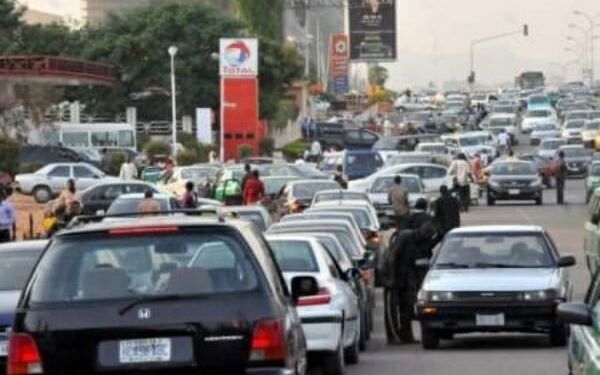Long queues and fuel scarcity have begun to plague various parts of Nigeria, according to reports.
Across major cities such as Lagos, Kano, and Abuja, it has been observed that most fuel stations are either not dispensing fuel or are experiencing extended queues of vehicles.
In Kano State, commuters feel the pinch as commercial transport fares have surged due to the increased fuel prices. Signs of fuel scarcity started to emerge a few days ago, and it is now evident as many filling stations in Kano State have closed down, causing the pump price to rise.
Only a few filling stations are operational, but they are dealing with long queues. The price of fuel in these operational stations has surged to between N640 and N660 per liter, compared to the initial range of N615 to N620.
Tricycle operators, like Usman Umar, are concerned that they may have to halt their operations because people can hardly afford the elevated transport fares. Aminu Bala, a car owner, has already parked his car and opted for a motorcycle due to the high fuel prices.
Alhaji Gana Girgir, Chairman of the Independent Petroleum Marketers of Nigeria (IPMAN) in Kano, explained that many marketers had to close down their operations because of the recent increase in the landing cost of petrol and the surge in diesel prices.
In Lagos State, many major filling stations in the Ikeja metropolis are not selling fuel due to a supply disruption across the state.
Akin Akinrinade, Chairman of the Independent Petroleum Marketers’ Association of Nigeria (IPMAN) at Ejigbo Satellite Depot, stated that the main depot supplying IPMAN has not been dispensing fuel for close to three months. He cited this as a result of the main supplier’s inactivity and the inability to approach private depots due to their pricing.Meanwhile, independent oil marketers are requesting that the federal government grant qualified members access to official foreign exchange to import fuel. They argue that this would enable them to compete fairly with the Nigerian National Petroleum Corporation Limited (NNPCL) and break its monopoly.
Independent marketers have been operating at a loss at the current government-fixed fuel pump price. The NNPC is currently the sole company importing fuel into the country, even though the government has issued licenses to private companies. Access to the official exchange rate is currently limited for independent marketers, and the insufficient supply of dollars through the Investors’ and Exporters’ (I&E) window is exacerbating the issue. Additionally, freight costs pose a challenge, as the Nigerian Port Authority (NPA) and the Nigerian Maritime Administration and Safety Agency (NIMASA) require payments in dollars.
The Nigerian Midstream and Downstream Petroleum Regulatory Authority (NMDPRA) organized a meeting in Abuja to address these issues, seeking input from all relevant stakeholders in the oil industry to ensure fuel availability in the country.






Leave a Reply